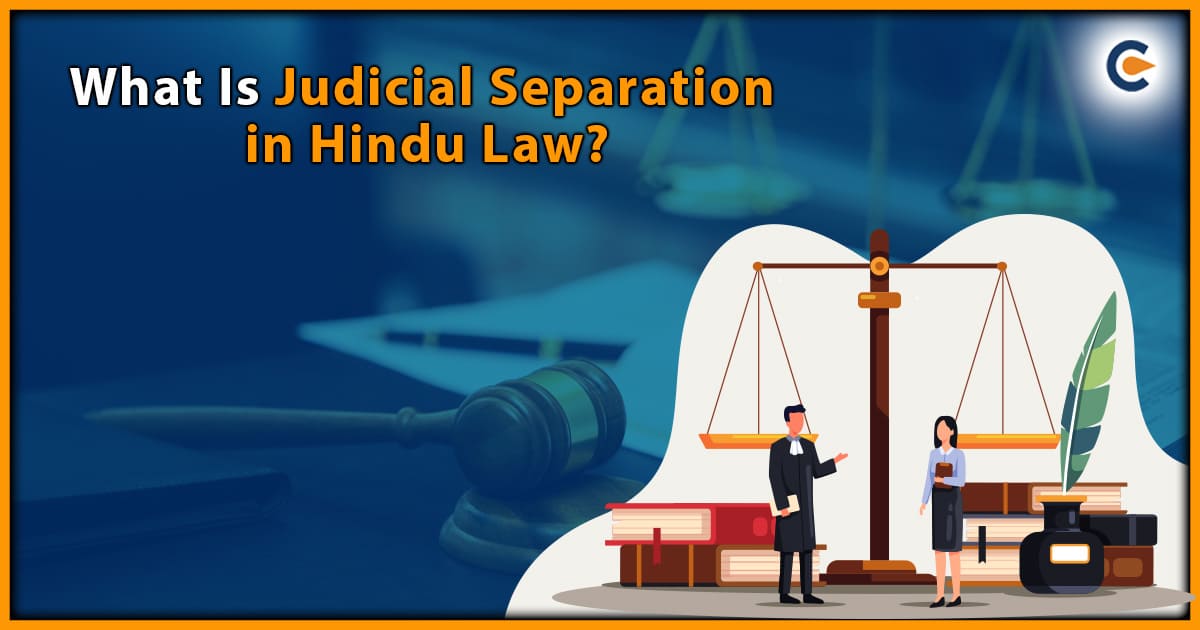The concept of marriage is based on the traditional Hindu system of marriage. It recognizes marriage as a sacred bond between two people and a long-term commitment. Old Hindu Laws state that marriage is the official rite and a religious bond that cannot be separated. The purpose of marriage is to enable both a man and a woman to fulfill the religious obligations of life. A man, according to ancient texts, was incomplete without a woman, and a woman was incomplete without her husband.
According to current legislation, if a person decides that they do not wish to continue their married life and want to be apart from each other, they may apply for judicial separation under the Hindu Marriage Act, of 1955.
What Is Meant by Judicial Separation in Hindu Law?
It is a legal remedy for married couples who are unable to live together due to certain circumstances. According to Section 10 of the Hindu Marriage Act, 1955[1], it can be obtained through a civil court order. Either spouse may file a petition for it on the grounds of cruelty, desertion, adultery, or any other legal reason deemed to be sufficient. If the court determines that the petitioner’s grounds have been sufficiently confirmed, it may issue a decree of judicial separation.
Once a judicial separation decree is issued, the parties are free to live separately and are not required to cohabit. They can’t get remarried, but they are still legally married. As part of the decree, the court may additionally specify support, child custody, and property division.
It decree does not end a marriage. The couple is still legally married and has the option to get back together and start over at any time. They will need to submit a separate divorce petition if they decide to divorce later.
In general, the concept of it in Hindu law gives married couples a way to secure a divorce if they are unable to cohabitate while still being legally married.
Grounds For Judicial Separation Under the Hindu Marriage Act, 1955
Under Section 10 of the Hindu Marriage Act, 1955, a married couple can seek a decree of judicial separation from the court on certain grounds:
- Cruelty: If one spouse feels that the other has treated him or her so cruelly that it is impossible for them to live together, that spouse may request a judicial separation. In the case of Shyamsundar v. Shanta Devi, the wife was gravely injured by the family of her husband after the marriage, and the husband did nothing to defend her. According to the Court, it amounts to the cruelty of the husband to intentionally neglect to protect his own wife.
- Desertion: The other spouse may file for judicial separation if the first spouse has abandoned the second without a good explanation for a continuous period of two years or more. In the case of Meena v. Lachman (1959), the wife went to her parents’ house without telling her husband and gave him false assurances that she would return, but she didn’t for two years. The Bombay High Court declared judicial separation and declared desertion.
- Adultery: The opposite spouse may get a court separation decree if one spouse has engaged in adultery. However, the petitioner must prove that he or she has not condoned adultery or lived with the other spouse after discovering it.
- Conversion: The other spouse may file for judicial separation if the other spouse has converted to a different religion. However, the petitioner must demonstrate that the other spouse’s behavior or manner of life has changed significantly as a result of the conversion.
- Mental sickness: If one spouse has a mental illness that prevents them from cohabitating, the other spouse may file for judicial separation. Anima Roy vs. Prabodh Mohan Ray (AIR 1969), in this case, the respondent was discovered to be afflicted with an unusual condition after just two months of marriage. The respondent’s doctor was unable to pinpoint when the sickness first manifested itself. As a result, it was decided that there was no evidence of sickness at the time of marriage.
- Venereal disease: If one spouse has been infected with a transmissible form of venereal disease, the other spouse may file for judicial separation.
- Renunciation of the world: The other spouse may file for judicial separation if one spouse has given up on the world and converted to sanyasa or sanyasini.
- Civil death/presumed death: If a person has been missing for seven or more years and has not been heard from by family members or anybody else, or if it is thought he or she may have passed away. Here, the opposite partner may submit a court separation petition.
Additional Grounds for Wife to File for Judicial Separation
- Bigamy: It means if the husband is remarried while he is already married, both of his wives have a right to claim the petition for judicial separation with the condition that the other wife is also alive at the same time of filing.
- Rape, sodomy, or bestiality: If the spouse commits crimes like rape, bestiality, or sodomy after the marriage, the wife has the right to file a petition for judicial separation.
- Rejection of marriage: A girl has the right to request judicial separation if her marriage took place before she was 15 years old.
How To File a Petition For Judicial Separation?
- Gather necessary documents and evidence: The marriage certificate, proof of address, and documentation to support the grounds for divorce are a few of the documents and proof you’ll need to collect.
- Prepare the Petition: Prepare the petition, which should contain the names of the parties, the reason for the judicial separation, and any other pertinent information.
- File the petition: Depending on your place of residence or the location of the marriage, the petition must be filed in an appropriate court. You must submit the petition with all appropriate supporting documentation and pay the necessary court fees.
- Provide notice to the opposing party: After filing the petition, you must provide notice to the opposing party (spouse) and give them an opportunity to respond to the petition.
- Attend court proceedings: The petition will be reviewed by the court, and the court will announce hearing dates to hear the arguments of the parties. These hearings must be attended in order for you to argue your case.
- Final court decision: The court will make a decision about the petition for judicial separation after taking into account all of the evidence and arguments.
- Obtaining a copy of the decree: Obtain a copy of the judicial separation decree if the court accepts the petition.
Can A Couple Reconcile After Obtaining a Decree of Judicial Separation
Yes, a couple can get back together after receiving a judicial separation decision. It is a type of legal separation that does not result in the dissolution of the marriage but permits the parties to live apart, which ends in the termination of some marital duties and rights. In fact, it is often seen as a short-term solution that enables couples to live apart while they evaluate their relationship with the intention of getting back together in the future. The court may also support the couple’s reconnecting and offer counseling.
The parties are not prohibited from getting back together and starting a new chapter in their relationship if they choose to do so by the court separation judgment. In fact, if both parties agree to do so and submit a joint application to the court, a judgement of judicial separation may be changed to a decree of restitution of conjugal rights.
However, if the couple decides to get back together and live together after receiving a judicial separation order, they must inform the court of their choice and submit an application to have the decree of judicial separation revoked. If the court is convinced that the parties have made up and want to get back together, it may decide to rescind the judicial separation decision.
What Are the Requirements for Filing a Joint Application to Withdraw the Decree of Judicial Separation?
The following conditions must be satisfied in order to submit a joint application to revoke the decree of judicial separation:
- Mutual consent: Only if both parties are in agreement to get back together and resume their marriage may file a joint application for a decision of withdrawal of the decree of judicial separation. The application cannot be submitted if one of the parties is unwilling to come to a settlement.
- Timeframe: The joint application may only be submitted one year after the date of the judicial separation decree. This is so that the parties may reconsider their decision and try to come to an agreeable solution during the court’s one-year cooling-off period.
- Application to the court: The joint application for the cancellation of the judicial separation order should be submitted to the court that issued the order. The request must be made in writing and include the names of the people involved as well as the justifications for making the decision.
- Appearance before the court: On the day of the hearing, both parties are required to present themselves in front of the court and express their desire to have the judicial separation decree withdrawn. The court may also request any extra information or documentation to confirm that the parties have made up and want to start a new life. together as husband and wife.
- Court order: The court may issue an order revoking the decree of judicial separation after taking into consideration the joint application and any further evidence. The parties can restart their marriage after the order has been granted.
What Are the Common Reasons for Withdrawing a Decree of Judicial Separation and Reconciling?
There are several reasons a couple can choose to dissolve their legal separation and get back together:
- Resolving differences: Disagreements may have been settled during the judicial separation time, and the couple may now want to give their marriage a second chance.
- Family pressure: The couple may have been encouraged to get back together and work on their marriage by family members and friends.
- Financial concerns: The cost of maintaining separate households may have become a burden, and the couple may decide to reconcile to save money.
- Welfare of the children: The couple may believe that maintaining a stable family environment and living together is in the children’s best interests.
- Love and affection: The couple may still have love and affection for each other and wish to resume their married life.
The choice to get back together should be based on a genuine desire to save the marriage and a willingness to cooperate to resolve any issues that might have contributed to the judicial separation.
Difference Between Judicial Separation and Divorce?
Despite having certain key distinctions, divorce, and judicial separation are two legal concepts associated with the breakup of a marriage:
- Effect on marriage: A judicial separation is a legal separation that permits the partners to live separately but does not dissolve the marriage, whereas a divorce results in the dissolution of the marriage.
- Grounds: The grounds for judicial separation include only cruelty, desertion, and adultery, whereas the grounds for divorce are wider and include cruelty, adultery, desertion, and irretrievable dissolution of marriage.
- Custody and maintenance: In divorce proceedings, the court may order maintenance and make a decision regarding child custody, whereas, in a judicial separation, the court may order maintenance but does not make a decision regarding child custody.
- Remarrying: Following the finalization of the divorce decree, the parties to a divorce are able to wed again. In contrast, the parties to a judicial separation continue to be legally wed and are so unable to remarry.
- Suitability: Partners who want to live apart but aren’t ready for divorce frequently request a judicial separation, whereas partners who want to dissolve their marriage typically request a divorce.
The biggest difference between a divorce and a judicial separation is that a divorce ends the marriage, whereas a judicial separation is a legal separation that permits the partners to live separately but does not end the marriage.
Conclusion
Instead of divorcing, spouses may decide to give some time to consider the problems and confusion in their marriage and, if possible, work to address them amicably. This procedure is known as judicial separation. Therefore, judicial separation provides couples time to work on their relationship.
In accordance with Hindu law, a married couple may apply for judicial separation, which entitles them to a court order allowing them to live apart without divorcing. Couples might use this as a temporary remedy while they consider their marriage and try to work out the problems that caused the separation. In the event that the couple decides to get back together, they may submit a joint application to vacate the judicial separation order and continue their marriage.
Read Our Article: What Is Judicial Separation?











